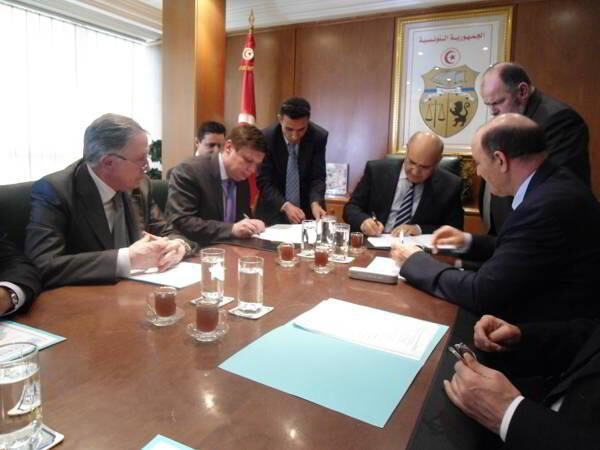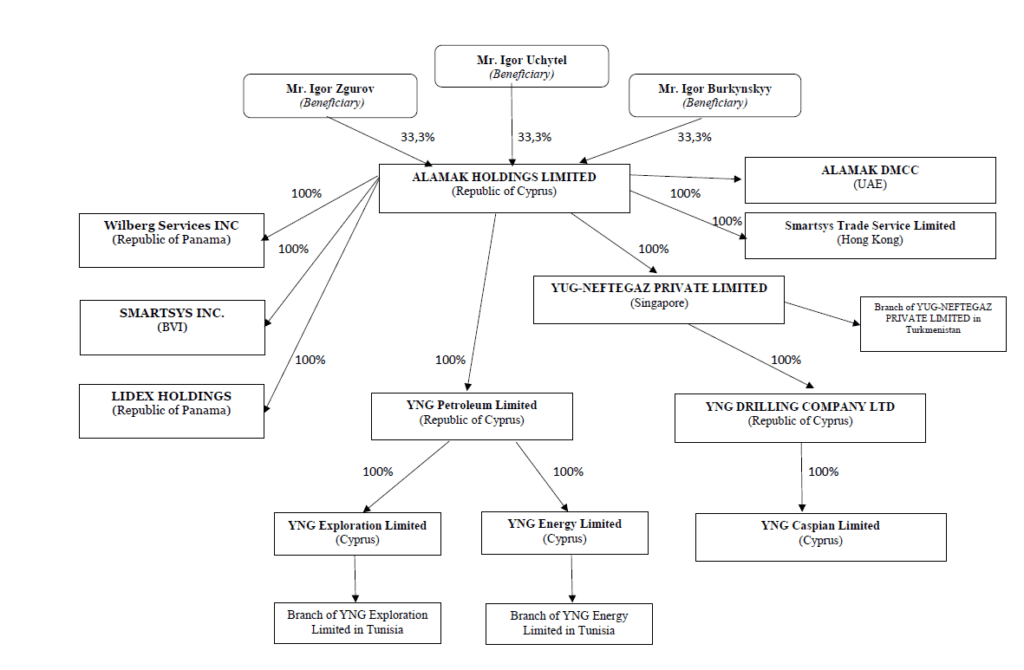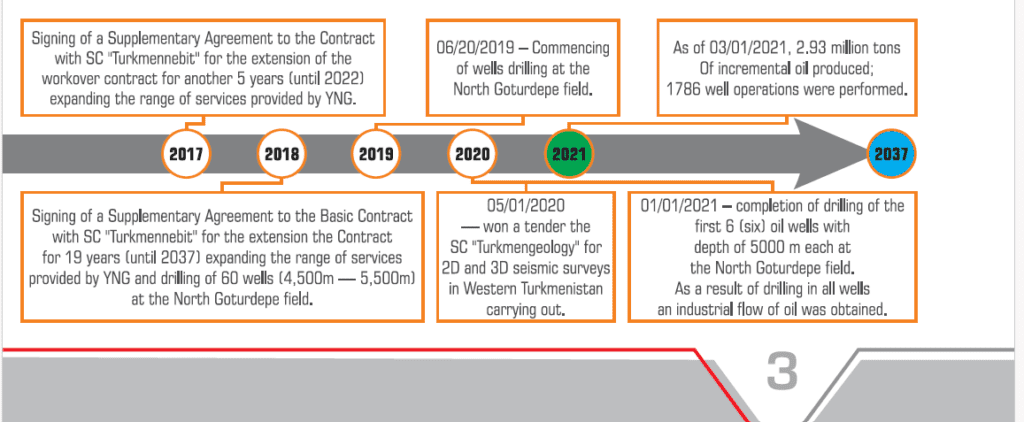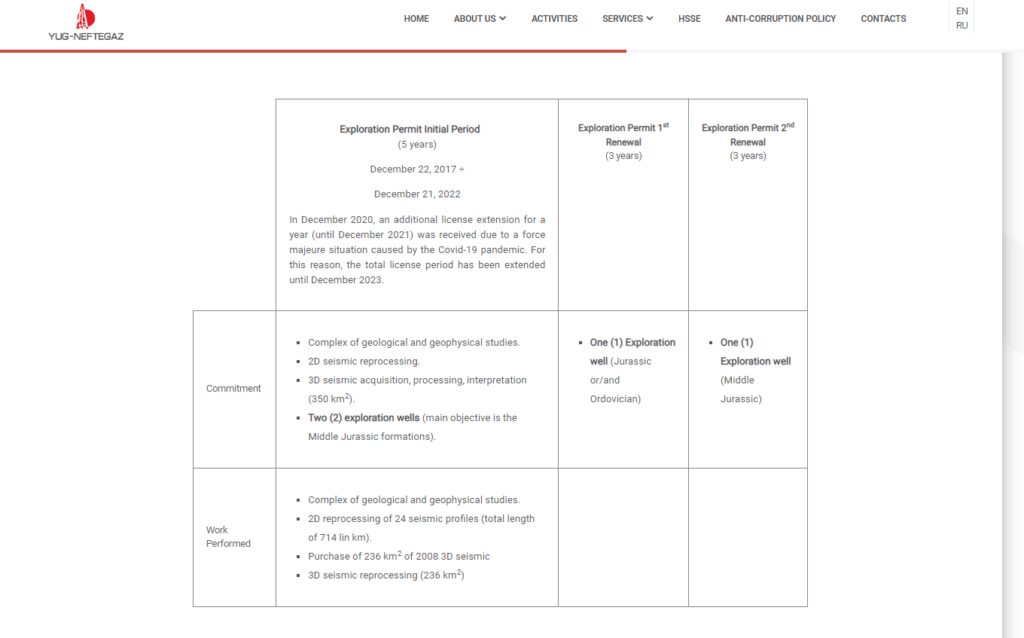In March 2013, the Tunisian Minister of Industry, Mohamed Lamine Chakhari, signed an agreement with Igor Burkynsky, the representative of the Ukrainian company YNG Exploration Limited, and Mohamed Akrouit, the representative of the Tunisian Petroleum Activities Company (ETAP), granting the Ukrainian company an exploration license for oil in the Areefah region in the southern Tunisian province of Tataouine.
The agreement, which is intended to last for five years, allows the Ukrainian company to conduct research, development, and exploitation of hydrocarbon deposits, perform seismic surveys, and drill two exploratory wells at an estimated cost of $21 million dollars. Under this agreement, the Ukrainian company entered into a partnership with the Tunisian Petroleum Activities Company, a Tunisian public company. The agreement stipulates that the two companies share profits equally in the event of any potential hydrocarbon discoveries.
YNG Exploration Limited, registered in the British Virgin Islands, a tax haven, was later registered in Cyprus. It is fully owned by YNG Petrolium Limited, registered in Cyprus and owned by another company, Alamak Holdings Limited, also registered in Cyprus, specializing in the production and sale of gas and petroleum. Among the shareholders is Igor Burkynsky, and Igor Uchytel, who is surrounded by corruption suspicions in his home country, Ukraine.
The latter was present at the time of signing the agreement with the Ukrainian delegation in Tunisia, as confirmed by the official photo published for the signing ceremony.

Image of the official signing ceremony in Tunisia for the exploitation of the Areefah license with Igor Uchytel (on the left).
Corruption Suspicions Surrounding Ukrainian Businessman Igor Uchytel
Around the same period, in January 2013, Ukrainian media criticized the high prices at which natural gas was sold to government institutions, educational administrations, and village councils in the Odessa region of Ukraine by the government-owned company Odesagaz, led by Igor Uchytel. The sale price was $842 per thousand cubic meters, while the usual price did not exceed $421 per thousand cubic meters. Odesagaz had received a substantial fine in the fall of 2012, amounting to about $3.31 million, from the Antimonopoly Committee for selling gas cylinders to citizens at inflated prices.
In 2015, Igor Uchytel, a wealthy businessman and former deputy of the regional council in the Odessa region of Ukraine, was implicated in a scandal involving the purchase of helical pipes for use in oil well treatment at three times their original price. The $5.8 million deal benefited the Ukrainian state-owned company Ukrgazvydobuvannya PJSC, and the purchase process was won by the London-registered company Moston Properties Limited through a local tender in the spring of 2015. It was later revealed that the pipes were intended for wells in the sea, while the wells owned by the Ukrainian state company were on land. The true value of the pipes did not exceed $1.7 million.
Interestingly, these fittings were supposed to be purchased in 2013 by another Ukrainian government company for gas production, located in the Crimean Peninsula, called Chornomornaftogaz. This company had dealt with a London-based company to purchase the equipment. This London-based company won the bid against YNG Petrolium, a company connected to Uchytel. However, the deal did not go through.
Two years later, the same fittings were sold at three times their cost to Ukrgazvydobuvannya PJSC. After a change in management and the discovery of what had happened, it refused to pay half the amount to Moston Properties Limited. The latter filed a case with the International Commercial Arbitration Court in London, represented by the Ukrainian lawyer Artem Sidelnikov, who manages a group of companies close to Uchytel. Sidelnikov was also close to Uchytel during his electoral campaign for the legislative elections in 2014, as reported by the Ukrainian investigative site Bihus.info. The site also hinted that Uchytel might be the true owner of Moston Properties Limited.
This case, among others related to corruption, was linked to Igor Uchytel, the company’s alleged owner and a shareholder in several companies in Ukraine and abroad.
Alamak Holdings Limited: The Real Owner of Petroleum Companies Operating in Tunisia
The names Igor Uchytel, Igor Burkynsky, and Igor Zaghurov appeared in the data review as part of Cyprus Confidential, an investigation led by the International Consortium of Investigative Journalists (ICIJ) in collaboration with partners from more than 60 media outlets, including Daraj. This investigation, based on leaked documents, sheds light on the role of the Cypriot island in assisting authoritarian entities in evading Western laws.
In 2020, the three partners used the Cypriot company Cypcodirect’s services to help them find directors for Alamak Holdings Limited, in which they jointly own capital. The data obtained from Cyprus Confidential indicated that this company was classified by Cypcodirect as “high-risk,” without providing the reasoning behind it. However, Alamak Holdings Limited and Igor Uchytel both pop up in Cypcodirect’s list of its so-called “High Risk Clients.” Uchytel is classified as an Ultimate Beneficial Owner (UBO), meaning that he is the true owner of the company, and as a “Politically Exposed Person,” which indicates a person holding a prominent public position in governmental bodies. Typically, the Financial Action Task Force (FATF), an international governmental organization working to set international standards for combating money laundering, terrorist financing, and the proliferation of weapons, considers politically exposed persons as potential risks due to their potential involvement in bribery and corruption issues by virtue of their positions and the influence they may exert.
The data also confirmed that Alamak Holdings Limited was registered in Cyprus on August 19, 2016, and is owned by the three Ukrainian businessmen: Igor Uchytel, Igor Burkynsky, and Igor Zaghurov, each owning 33.3 percent of the company’s capital, equivalent to 1400 shares each. The data also revealed that Alamak Holdings Limited wholly owns the company Yug-Neftegaz Private Limited, registered in Singapore, which invests in oil and gas exploration in Azerbaijan, Turkmenistan, and Tunisia. This company is managed by Igor Burkynsky.


Composition of the Companies under Alamak Holdings Limited.
Alamak Holdings Limited also wholly owns YNG PETROLIUM LIMITED, which in turn owns YNG ENERGY LIMITED and YNG EXPLORATION LIMITED. These two companies operate in Tunisia in oil and gas exploration in partnership with the Tunisian National Oil Company (ETAP). In 2021, Mr. Alexander Beljouk, a Ukrainian national, was appointed as Business Development Manager for the two Ukrainian companies in Tunisia. His resume indicates that he previously held the same position in Yug-Neftegaz Private Limited.
In a letter dated April 30, 2020, Alamak Holdings Limited committed to providing financial support to YNG PETROLIUM LIMITED to help cover “any shortfall in ownership rights and any liquidity requirements that may arise to cover the company’s obligations, for a full year.”


The same commitment was made by Alamak Holdings Limited for the benefit of YNG ENERGY LIMITED and YNG EXPLORATION LIMITED in an unsigned letter dated back to March 29, 2021.


Alamak Holdings Limited has two bank accounts: one in Switzerland at CIM Bank and another at GPB International S.A Bank, which is a wholly-owned subsidiary of Gazprombank, the third-largest financial institution in Russia, as stated on the bank’s website.
On October 27, 2021, approval was given to allocate $500,000 to each of the three businessmen who are shareholders in Alamak Holdings Limited as temporary profits.
Exploiting Exploration Licenses and Not Fulfilling Commitments in Time
In defining its projects in Tunisia, Yug-Neftegaz Private Limited, overseeing the activities of a group of companies, including YNG Exploration Limited and YNG ENERGY LIMITED, stated on its website that “Tunisia is a stable country with an investment-friendly climate for the oil and gas industry and is close to European markets. The country has advanced infrastructure and significant untapped potential in the oil and gas sector.” This may have influenced the company’s decision to invest in Tunisia.
As such, through its Tunisian branch, YNG Exploration Limited signed a partnership agreement with ETAP in March 2013 to obtain the Areefah exploration license covering an area of 988 square kilometers north of the Burma field in southern Tunisia.
The agreement stipulates that the Ukrainian company will conduct geological and geophysical studies, perform 3D seismic surveys, and drill two exploration wells. In the event of oil discovery, profits will equally be shared with ETAP.
The initial agreement period spanned over five years from 2013 to 2018, later extended for another two years until December 2020. Meanwhile, the license area was increased to 1012 square kilometers in 2017 without any justification by the supervisory authority, the Ministry of Industry, Energy, and Mines, according to the analytical study, “Insights into Hydrocarbon Contracts in Tunisia,” issued by the Tunisian Association of Public Monitors in 2018.
According to the Petroleum Law issued in 1999, the initial period for exploiting hydrocarbon exploration licenses does not exceed five years, and it can be renewed for two consecutive periods, each with a maximum of four years. There is also the possibility of extension within each renewal period for up to three years. However, renewal or extension is always contingent upon fulfilling the commitments undertaken by the company exploiting the license.
By the end of the first extension in the original period, the Minister of Industry issued a decision on March 26, 2021, regarding the extension of the Areefah hydrocarbon exploration license under the status of force majeure, without specifying its nature. This was based on a request submitted by YNG Exploration Limited to the General Directorate of Hydrocarbons at the Ministry on April 3, 2020, as mentioned in the ministry’s decision published in the Official Gazette of Tunisia. Consequently, the license was extended for six months from December 27, 2020, to the same date in 2021.
According to Article 26 of the partnership agreement between YNG Exploration Limited and ETAP, force majeure refers to any external fact or event that constitutes an unpredictable and unavoidable situation for the affected party, preventing it from performing all or part of its obligations under the partnership contract. In case of a force majeure, commitments are automatically extended for a period equal to the delay caused by the force majeure event, and, depending on the situation, the time needed for the natural resumption of activities is added.
Ghazi Ben Jami’, an expert in the hydrocarbon sector and one of the contributors to the analytical study, “Insights into Hydrocarbon Contracts in Tunisia,” believes that the state did not explain the “meaning of force majeure” to adequately justify the extension. In his opinion, the COVID-19 crisis that occurred globally during that period cannot be considered a force majeure preventing oil companies from carrying out their activities, as many petroleum companies operating in Tunisia continued their work in exploration and extraction. “This could create discrimination among investors,” he said.
On the other hand, while browsing the Yug-Neftegaz Private Limited website, it is noted that the two Ukrainian companies operating in Tunisia and which Yug-Neftegaz is overseeing continued their exploration activities in Turkmenistan, where they are also present, between 2020 and 2021. Furthermore, they announced on January 1, 2021, that they had drilled 6 exploratory wells.


Yug-Neftegaz’s Announcement on Drilling 6 Exploration Wells in Turkmenistan on January 1, 2021.
Furthermore, in the second chapter of the Minister of Industry’s decision to extend the validity of the Areefah license, it was stated that “during the license’s validity period, all commitments undertaken, with a total estimated cost of $16.2 million, must be fulfilled.” However, examining YNG Exploration Limited’s accomplishments during that period reveals that it did not fulfill all its commitments, especially drilling two exploration wells. For instance, no exploratory wells were drilled during the first extension period from 2018 to 2020 and during the second extension period (citing force majeure) from 2020 to 2021. This information is based on data published on the Tunisian National Oil Company’s website. The data also indicated that the first exploratory well, Araifa-1, was completed in February 2022, while the second well, Araifa-2, first began construction on January 18, 2023, and finished on March 23, 2023, almost at the beginning of the first renewal period (December 2022 – December 2025).
In response to our email sent to the Ministry of Industry and Mines and Energy on November 24, 2023, where we inquired about this issue, we received a written response from the Tunisian National Oil Company. It stated that, regarding the drilling of Araifa-2, approval for drilling and the initial budget allocation was granted in December 2021. However, the actual preparations for drilling began in the second quarter of 2022, while the actual drilling started on October 24, 2022. Thus, “YNG Exploration Limited is considered to have started fulfilling its commitments. The ongoing work is that when the operator demonstrates seriousness in fulfilling its commitments, the granting authority usually appreciates and considers it as fulfilling its obligations, even if the completion period exceeds the next period, whether it is an extension or renewal.”
Yug-Neftegaz Private Limited, overseeing the activities of a group of companies, including YNG Exploration Limited and YNG Energy Limited, did not respond to our email regarding our inquiry about the latter’s delay in fulfilling its commitments during the specified period.
In 2017, Yug-Neftegaz Private Limited expanded its activities in Tunisia by signing a new agreement with the Tunisian government through another company it manages in Tunisia, YNG Energy Limited. This agreement allows for the exploitation of the Nefzawa exploration license in southern Tunisia, involving a 50/50 partnership with the Tunisian National Oil Company. The agreement came into effect in December of the same year, covering an area of approximately 3032 square kilometers. The Ukrainian company committed to conducting seismic surveys and drilling two exploratory wells, with a total cost of $8.6 million per well.
The initial license period, granted for five years, ended on December 21, 2022. Meanwhile, the research area was increased by 100 square kilometers, making the total area 3132 square kilometers, according to a decision by the Minister of Industry, Energy, and Mines issued on March 18, 2021. The company did not fulfill its commitments to drill the two exploration wells, as stated on the Yug-Neftegaz Private Limited website. Nevertheless, it was granted an additional one-year extension until December 26, 2023, with a force majeure cited as justification.


Yug-Neftegaz’s Update on “Nefzawa” Exploration License.
As the expiration of the Nefzawa exploration license approaches, no decision has been issued by the ministry regarding its possible renewal. According to petroleum laws, the investor must declare their intention for legal renewal or relinquishment at least two months before the license’s expiration. This involves settling all contractual obligations, abandoning wells, and restoring the area to its original state. As of now, no such decision or announcement has been made, and Yug-Neftegaz Private Limited’s website outlines plans for completing an exploratory well during the first renewal period (3 years) and another well during the second renewal period (3 years), without specifying whether an application has been submitted to the Ministry of Industry, Mines, and Energy for these plans.
In response to our inquiry on this matter, the Tunisian National Oil Company stated that, along with its Ukrainian partner, they submitted a request for a two-year extension of the Nefzawa exploration license on October 4, 2023, intended to span between December 22, 2023 till December 21, 2025.
As of now, supervisory authority approval for the extension has not been issued.
Despite the continuous delays by the two Ukrainian companies in fulfilling their commitments, YNG Exploration Limited obtained a third exploration license in 2022. This license, the Bir Abdallah license, covers an area of 2116 square kilometers in the Tataouine region of southern Tunisia. The company committed to conducting geological studies, seismic surveys, and drilling an exploratory well. The license extends for a duration of 5 years, up until July 21, 2026.
To seek further clarification, we attempted direct communication with the Tunisian branch of YNG Exploration Limited located in the Buhayra region of Tunis. However, our request for an interview was declined, and we were asked to send an email with our questions. In the end, our questions remained unanswered.
Sharaf al-Din Al Yaqoubi, an expert in hydrocarbons and one of the contributors to the analytical study, “Insights into Hydrocarbon Contracts in Tunisia,” explains the regulating authority’s leniency towards petroleum companies regarding their non-compliance or delays in commitments by stating: “Tunisia no longer attracts large petroleum companies, and the companies exploiting exploration licenses are mostly small companies with weak technical capabilities. Therefore, the regulatory authority turns a blind eye to many points, given the low demand for exploration in the Tunisian territory.”






